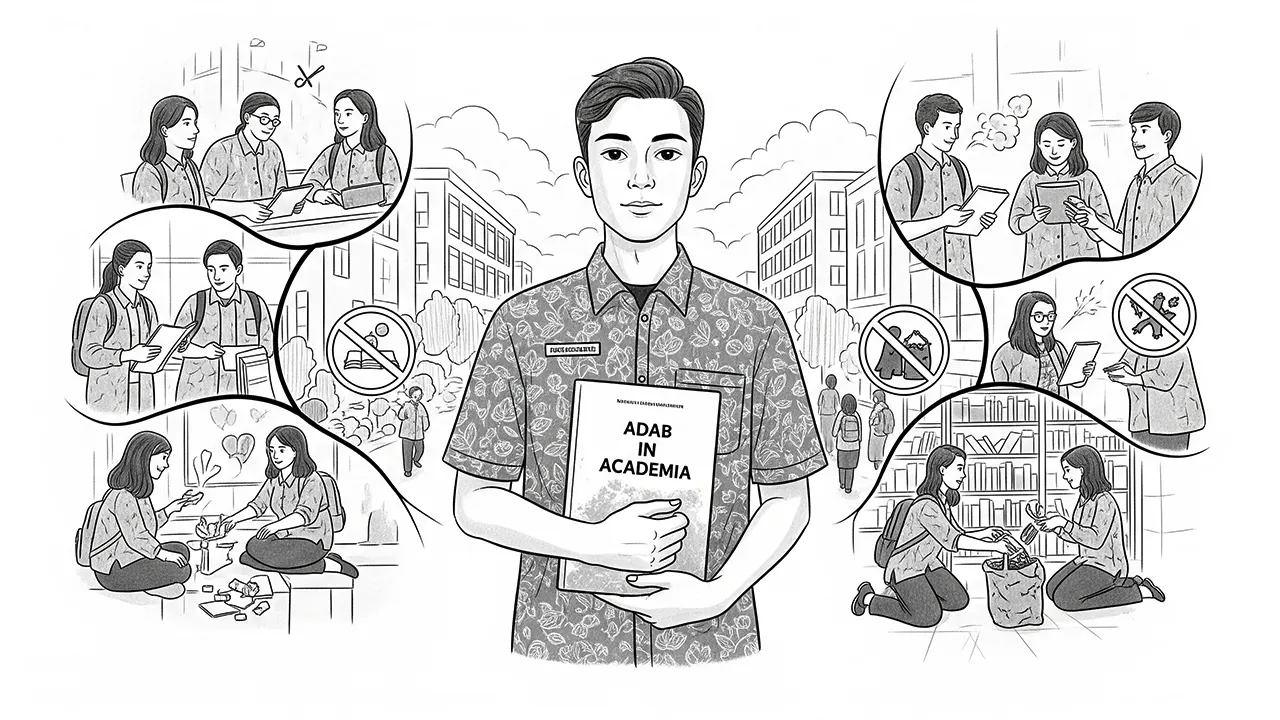Campus is a second home for students, a place where they spend most of their time studying and developing themselves. In this diverse academic environment, the importance of maintaining manners and ethics cannot be ignored. Being civilized in a campus environment is not just a formality, but a foundation that determines the quality of academic life and the formation of student character.
Adab, which means “politeness” or “manners” in Arabic, is more than just a set of structured guidelines. More than that, adab is a sign of respect for others, spiritual maturity, and awareness of one’s place in the academic community. Adab is becoming more and more important in face-to-face encounters on campus in this day and age, when social media and technology rule our communication.
With students from many socioeconomic, religious, and cultural backgrounds on campus, etiquette is essential as a unifying factor. Diversity that ought to be a strength can instead become a cause of contention and division if it is not handled with grace. Thus, in addition to being a moral obligation, it is also practically necessary to comprehend and use manners in the campus setting in order to foster a positive academic environment.
n addition to feeling more at ease when interacting with others, students who are well-mannered will experience long-term advantages in the development of their social and professional life. Campuses are a great area to practice and develop civilized skills that will be very helpful when entering the workforce and larger society because they are smaller versions of society.
What is the primary justification for the importance of manners in developing students’ character?
Manners have an essential role in human existence, particularly in the process of character building. When it comes to pupils, manners have a significant impact on personality development and how an individual engages with their environment. Students must possess both moral and social maturity in addition to intellectual intelligence in order to succeed on college. This is when being polite is important.
- Manners as the Foundation for the Formation of Moral Identity
College is a crucial stage in a person’s life since it teaches them to be self-sufficient and not rely too heavily on their parents. They start to develop their identities and learn how to be mature people at this point. Since they assist pupils in making wise selections, manners or polite behavior are crucial during this process.
Students eventually develop these habits as they become accustomed to being courteous, truthful, and respectful of others. Additionally, manners educate students how to act appropriately in a variety of circumstances. For instance, a student is likely to be truthful elsewhere if he is upfront with his lecturer about being late with an assignment. Such habits will develop a strong and honest personality, which is the foundation of excellent character.
- Development of Emotional and Social Intelligence
Manners are more than just external behavior; they also include emotional control and social sensitivity. Civilized kids learn to manage their emotions well, do not become enraged when reprimanded, and can express themselves in a way that does not insult others. This procedure directly increases their emotional intelligence.
Students learn how to analyze circumstances and react correctly in a social setting by practicing manners. They learn how to accept different viewpoints, how to appropriately handle disagreements, and when to talk and when to listen. The development of emotionally and socially mature people depends on these abilities.
- Formation of Long-Term Positive Habits
Character development occurs through the persistent repetition of behaviors until they become habits. Manners establish a framework for the development of these healthy habits. When kids continually demonstrate politeness, honor promises, arrive on time, and respect for others, these actions become routine and develop positive behavioral patterns.
College students who learn to respect time are more likely to be punctual and disciplined workers, while those who learn to listen to others can develop into good leaders. Thus, manners can be regarded as an important provision for developing good character in the future.
- Increasing the Feeling of Accountability and Responsibility
Students who are well-mannered learn to take responsibility for their words and deeds. A student must take responsibility for their actions when they pledge to behave in a courteous and respectful manner. This makes people more conscious of how their actions affect other people as well as themselves.
This sense of obligation eventually evolves into a broader accountability. Civilized students will feel accountable not only for their own academic performance, but also for fostering a positive environment for their peers. They will take proactive steps to uphold the institution’s reputation and contribute to the well-being of the campus community.
- Improving Introspection and Self-Reflection Skills
Students are encouraged to always think and reflect by manners. Students indirectly learn to assess their own behavior when they engage with others in a courteous and respectful manner. They wonder, “Was the way I spoke just now appropriate?” , “How do others feel when I behave like this?” , and “What can I improve in the way I interact?”
Self-reflection skills are crucial for character development because they enable pupils to keep learning and developing. They become more receptive to advice and helpful criticism from others, as well as more conscious of their own advantages and disadvantages.
- Self-control through manners in the age of liberty
The campus environment offers greater independence than earlier stages of schooling. Without etiquette, this freedom might be abused. Students with manners will understand how to utilize their freedom wisely, not act arbitrarily, and uphold the reputation of themselves and the institution. This creates a character who is emotionally and socially mature.
Loss of manners can have a negative impact on the campus environment
Among the factors that cause students to be uncivilized on campus include:
- Reducing the quality of interaction between students and lecturers
Without manners, the connection between students and lecturers becomes stiff, disharmonious, and may even lead to conflict. Students that are disrespectful during debates, do not respect the lecturer’s opinion, or do not follow class regulations can all contribute to an uncomfortable learning environment. As a result, the learning process is ineffective.
- The rise of a disrespectful culture
The growth of behaviors like disparaging one another, disregarding the opinions of others, and acting irrationally in groups and on campus is made possible by the lack of manners. This kind of culture can cause social distance between student groups and harm the sense of community.
- Individual or group conflict
Horizontal conflict can be brought on by impolite words, sarcasm, or the propagation of hatred. This is particularly risky on a diverse campus since it might deepen divisions based on ideology, background, or opinions.
- The campus’s declining reputation and image
The campus institution itself is represented by its students. The public may become less trusting of the university when student conduct shows a lack of etiquette. A university that has a reputation for having unruly, unpleasant, and unruly students will lose favor with the general public and the business community.
- Unfavorable conditions for learning
The comfort and security of the learning environment are directly impacted by the loss of manners. For instance, students who act irresponsibly in class, create noise, or disregard library policies and public spaces will hinder other students’ ability to concentrate. This produces an atmosphere that is not conducive to the best possible self-development.
- Character formation is impeded.
One of the primary purposes of higher education is to develop character. Students who lack manners develop into theoretically educated but psychologically or socially immature adults. This risks creating graduates who are not ready to handle life in society and the working world, which requires high ethics.
Solutions to Aid Students Become Civilized on Campus
To ensure that students have manners on campus, all parties involved must work together: institutions, professors, students, and the social environment. Manners must not only be taught, but also exhibited and developed into habits. When manners become a culture rather than a regulation, the campus will create not just educated graduates, but also moral, ethical, and character-driven individuals. The following are some methods to help students become civilized on campus.
- Implementing a Comprehensive Character Orientation Program
The campus should create an orientation program that focuses not just on academics, but also on character and moral development. This curriculum must be structured in a methodical manner to introduce noble principles, academic ethics, and campus-specific behavioral norms. This character orientation should take place not just at the start of courses, but also at regular intervals throughout the study time.
Orientation programs may include workshops on effective communication, emotional management, conflict resolution, and empathy development. New students must be clearly informed about campus conduct requirements, the consequences of breaching etiquette, and the long-term benefits of being respectful. Furthermore, the program might incorporate role-playing and simulations of real-life scenarios to provide practical experience.
- Development of Reward and Recognition Systems
Campuses must create a system of rewards that honors not only good academic performance but also polite conduct and constructive contributions to the campus community. Character scholarships, certificates of appreciation, or public recognition at campus activities are some examples of this incentive scheme. Students will be inspired to keep up their good behavior by this encouraging acknowledgement.
Students who consistently behave in a polite manner can be given particular distinction through the “Student of Character” program. Furthermore, a character point system that is interwoven with the academic system can be developed on campus. Positive behavior earns extra points, which might influence graduation requirements or recommendations for employment and scholarships.
- Educating and Developing Lecturers as Exemplars
Campus employees and lecturers should provide an example of polite behavior. As a result, educational institutions must regularly train its faculty and staff on the value of setting an example for students, how to communicate effectively with them, and how to deal with difficult situations politely. Students will naturally be influenced to conduct similarly by civilized instructors.
Mentoring programs between academics and students can also be formed to provide individual coaching on character development. Lecturers can serve as coaches, offering not only academic assistance but also constructive feedback on student behavior and attitudes. A close interaction between instructors and students will enable the transmission of positive ideals.
- Integrating Character Education into Curriculum
Character and moral education should not be viewed as distinct courses, but rather interwoven into the overall curriculum. Each course can provide character values related to their field of study. For example, a business course may emphasize integrity and corporate ethics, whereas an engineering course may emphasize professional accountability.
Campuses can also create mandatory courses on professional ethics, leadership, and character development. This curriculum should be structured in an interactive manner, with several case studies, group discussions, and projects involving practical character values.
- Community Formation and Peer Support System
Students are more easily persuaded by their peers than by campus authority. As a result, it is critical to establish a student community that prioritizes character development. This community could be a study group, a self-development club, or an organization that promotes social and volunteer activities. Students in this community can assist and remind one another to behave civilly.
Buddy system programs can be developed, in which senior students serve as mentors for junior pupils. This strategy promotes academic adaptability while also instilling positive attitudes and behavioral norms. Peer counseling can also be developed, in which trained students provide psychological assistance and character development to their friends.
Supervisor : Dr. Muhammad Iman Sastra Mihajat








